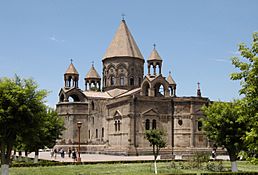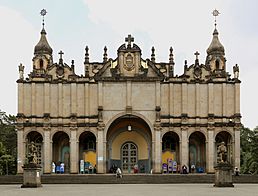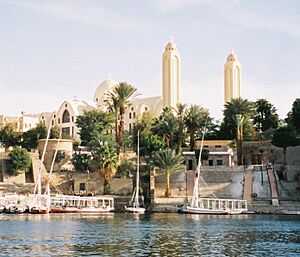Oriental Orthodoxy facts for kids
Quick facts for kids Oriental Orthodox Churches |
|
|---|---|
|
Clockwise from top:
Etchmiadzin Armenian Apostolic Cathedral, Saint Mark's Coptic Orthodox Cathedral, Enda Mariam Eritrean Orthodox Cathedral, Holy Trinity Ethiopian Orthodox Cathedral, Malankara Orthodox Syrian Catholicate Palace, Saint George Syriac Orthodox Cathedral. |
|
| Classification | Non-Chalcedonian |
| Orientation | Eastern Christianity |
| Theology | Miaphysitism |
| Polity | Episcopal |
| Structure | Communion |
| Language | Coptic, Classical Syriac, Ge'ez, Armenian, Malayalam, Koine Greek, local languages |
| Liturgy | Alexandrian, West Syriac and Armenian |
| Founder | Jesus Christ, according to sacred tradition |
| Separated from | Roman state Church |
| Members | 50 million |
| Other name(s) | Oriental Orthodoxy, Miaphysite churches, Oriental Orthodox Communion |
Oriental Orthodoxy refers to a group of Eastern Christian churches. These churches accept only the first three major church meetings, called ecumenical councils. These are the First Council of Nicaea, the First Council of Constantinople, and the Council of Ephesus. They do not accept the decisions made at the Council of Chalcedon. These churches are also known as the Old Oriental Churches. Oriental Orthodoxy is one of the oldest forms of Christianity. It is different from the churches known as Eastern Orthodoxy.
The Oriental Orthodox Churches include six main independent churches. These are the Coptic Orthodox Church of Alexandria, the Syriac Orthodox Church of Antioch (also known as the Jacobite Syrian Christian Church), the Armenian Apostolic Church, the Malankara Orthodox Syrian Church, the Ethiopian Orthodox Tewahedo Church, and the Eritrean Orthodox Tewahedo Church. They believe they are part of the original Christian Church. They see their leaders, called bishops, as the direct successors of Jesus Christ's first followers, the apostles.
Oriental Orthodox Churches were in communion (meaning they shared beliefs and practices) with the Roman Church before the Council of Chalcedon in 451 AD. They were also in communion with the Church of the East until the Council of Ephesus in 431 AD. Their main reason for separating was different ideas about the nature of Jesus Christ.
Most Oriental Orthodox Christians live in countries like Egypt, Ethiopia, Eritrea, India, Syria, Turkey, and Armenia. There are also smaller Syriac groups in Western Asia. Their numbers there are decreasing due to persecution. Many Oriental Orthodox Christians also live in other parts of the world. They have moved there, or joined the church through conversions and missionary work.
How Oriental Orthodox Christians Worship
Oriental Orthodox Christians use special prayer books. These include the Agpeya and Shehimo. They pray seven times a day at specific times, known as the canonical hours. When they pray, they face towards Jerusalem in the eastward direction. This is because they believe Jesus will return from the east. This practice comes from the Bible, specifically from Psalm 119:164.
Before praying, they wash their hands and face. This is a way to show respect and be clean before God. They also take off their shoes. This shows that they are praying in a holy place before a holy God. In this Christian tradition, women often wear a Christian headcovering when they pray.
How Oriental Orthodox Churches Are Organized
The Oriental Orthodox Churches are a group of six autocephalous churches. "Autocephalous" means each church is completely independent in how it is run. They are all in full communion with each other, meaning they share the same faith and sacraments.
Here is a list of the six main independent Oriental Orthodox churches. They are listed in alphabetical order. Some of their smaller, self-governing churches and regions are also included.
- Alexandrian Rite
- Coptic Orthodox Church of Alexandria
- French Coptic Orthodox Church
- Ethiopian Orthodox Tewahedo Church
- Eritrean Orthodox Tewahedo Church
- Coptic Orthodox Church of Alexandria
- Syro-Antiochene Rite
- Syriac Orthodox Church of Antioch
- Jacobite Syrian Christian Church
- Malankara Orthodox Syrian Church
- Syriac Orthodox Church of Antioch
- Armenian Rite
- Armenian Apostolic Church
- Mother See of Holy Etchmiadzin
- Armenian Patriarchate of Constantinople
- Armenian Patriarchate of Jerusalem
- Holy See of Cilicia
- Mother See of Holy Etchmiadzin
- Armenian Apostolic Church








